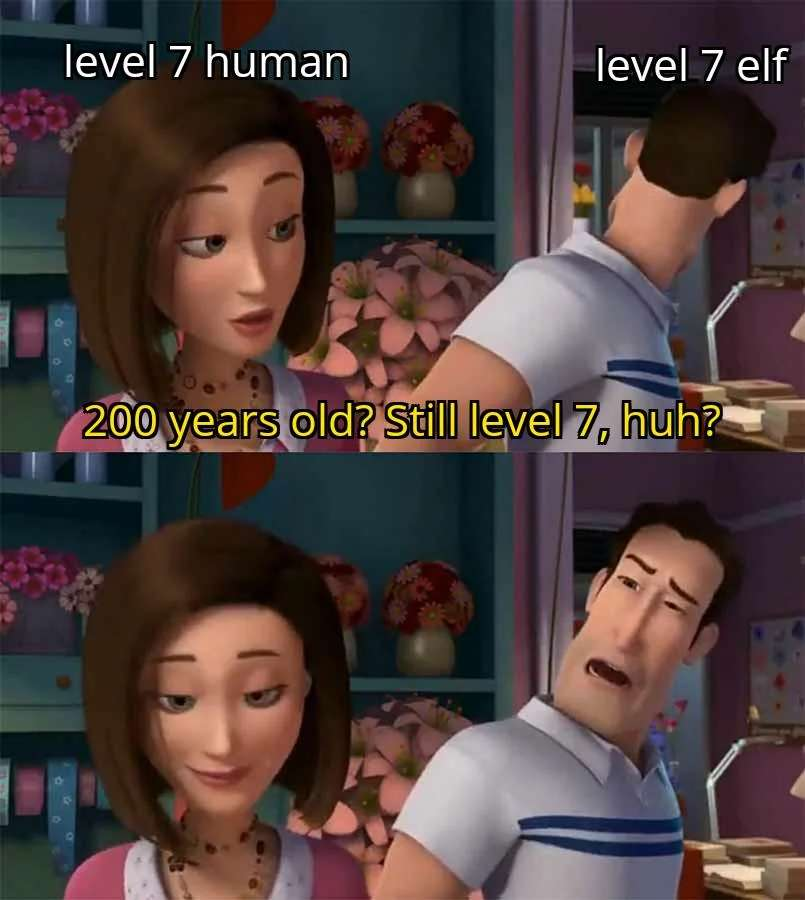this post was submitted on 27 Aug 2024
869 points (98.3% liked)
RPGMemes
10383 readers
15 users here now
Humor, jokes, memes about TTRPGs
founded 2 years ago
MODERATORS
you are viewing a single comment's thread
view the rest of the comments
view the rest of the comments

I like to think Elves go on an adventure at around age 70-90, get really super cool, take 100 years off, and then completely forget all their amazing skills because they've been learning the language of bees or doing sequoia trimming as a hobby for the last century.
Would be a cute fluffy class feature to just assign the very old elf an exceptionally difficult but totally useless skill at near-master level, to help explain why the Legendary Warrior of Old is now swinging for the minor leagues.
I do like the idea that elves just change their entire lifestyle every hundred years or so. They spend 80 years as a warrior, then decided to take up magic and became a wizard for the next 80 years.
I also like the idea of a human village that accidentally built 4 statues of the same elf who kept saving them with different skills.
There's a series of books called The Legend of Drizzt last time I checked (it's changed over the years, and the first book wasn't even supposed to be about him lmao) and in one of the books, our main character believes he has lost all his friends (not a spoiler, we already know who is okay and who isn't when he thinks this) and so he goes off alone into the mountains to kill orcs and goblins and shit until he maybe dies. A couple of elves way older than him meet him at one point, and since this is really the first time he's spent with elves long term since he left his underground homeland decades before, he doesn't really know "how to be an elf".
This is basically their philosophy.
Elves can live over a thousand years (one dark elf we know of is blessed by their evil deity and is over 5,000), but dwarves only about 2-400 years (I think?) and half lings about 100-150ish, humans standard 80.
Since you will lose 10 sets of "lifelong friends" at least, if they're human, many elves choose to stick with other elves.
But those that mingle, tend to segment their lives into smaller chunks.
Don't try to live your life all thousand years in one go, you will lose so much by doing so.
But if you think of your life as more "this is me now, I am very different from the person who wore this outfit 5 years ago, and this is who I will be for the next 100 years" then it becomes more manageable.
You never forget the friends and family you made in an old life, but you cannot carry your grief over losing them for the rest of your life.
Those that do end up sticking to their own kind, because it's less painful. (and also superiority complexes)
After reading The Age of Em (2016) by Robin Hanson, I wish there were stories about races that went the other way, lifespan-wise: extremely small people who lived only 1 year, even smaller people who lived only 1 month, some very extremely small but very powerful ones that lived only a day, etc. The idea is that artificial people (emulated people, or Ems) could have subjectively similar characteristics and experiences to the larger physical entities (e.g. humans, but perhaps even dwarves, elves, and etc., since theyʼre just emulated minds), but their artificial emulated substrate allows their minds to develop and age orders of magnitude faster; they also could solve certain problems orders of magnitude faster but practical limitations on delays between thought and physical interactions (your mind would waste away if you had to wait a whole subjective hour between each physical step during a walk with a standard 1.5 meter body) require their bodies to be very small.
Call them speedlings, or some variant of sprite, but I think its an interesting world-building concept.